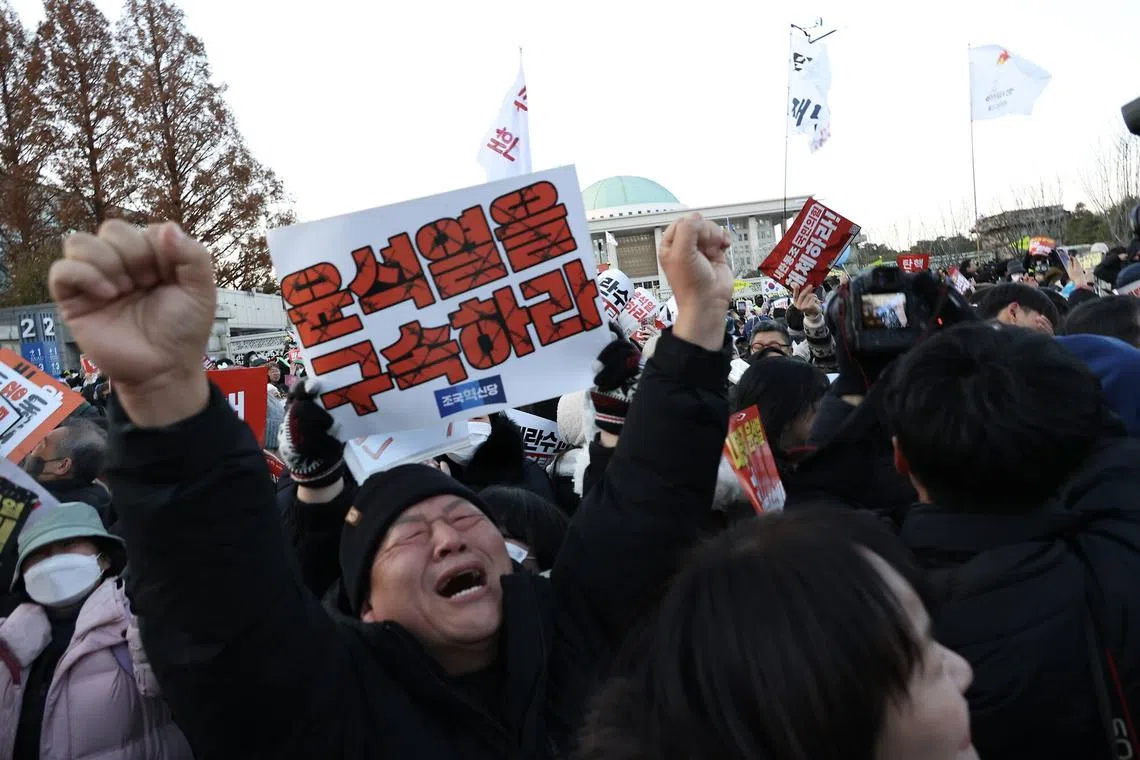Protesters in South Korea rejoice as lawmakers impeach Yoon
Sign up now: Get ST's newsletters delivered to your inbox

Demonstrators in Seoul celebrating after lawmakers passed a motion to impeach South Korean President Yoon Suk Yeol.
PHOTO: BLOOMBERG
Follow topic:
Protesters on the streets of Seoul erupted with emotion on Dec 14, after lawmakers passed a motion to impeach South Korean President Yoon Suk Yeol, whose short-lived declaration of martial law earlier in December stunned the nation.
As headlines flashed on their phones that enough officials had voted in favour of impeachment, anti-Yoon protesters screamed in jubilation near the National Assembly, chanting K-pop songs and releasing balloons into the air. About 200,000 people gathered in the area, local media outlets reported, citing an unofficial tally by police.
“I brought my kids here to show them how democracy works,” said Mr Arron Lim, who attended the protest with his wife and three young children. “Citizens are doing their duty.”
Dec 14 was a big day for South Korea and in Seoul, where many thousands have gathered over the past couple of weeks to voice their displeasure with – or support of – Mr Yoon.
The demonstrations have often felt a bit like concerts. K-pop fans turned out in droves, waving glow sticks representing their favourite pop groups and mostly pushing for Mr Yoon’s ouster. Many celebrities, unable to join the rallies in person, wired money to coffee shops and restaurants so protesters would have free food and beverages.
Mr Kim Hyun-jun, 50, a realtor, called the moment historic.
His 12-year-old son also spoke up. “I think our country will do better now,” he said.
Not everybody was happy. Near Gwanghwamun Square, a central landmark for Korean history, Mr Yoon’s backers were shocked at the outcome of the vote. Their placards read: “No impeachment.”
On many fronts, the breathless political turmoil in December has exposed a generational chasm between older, conservative South Koreans and younger, more liberal voters, who blame the President and his political allies for a lack of job opportunities and holding them back.
Some of Mr Yoon’s backers were especially disheartened that the impeachment motion – which still needs to be approved by the Constitutional Court – will empower opposition leader Lee Jae-myung. His left-leaning policy stances are not popular with conservatives.
“Martial law was declared lawfully. How can we have someone like Lee Jae-myung, who is facing trials, serve as our president?” said Mr Yoon’s supporter Chun Eun-yong, 68.
Mr Yoon’s most loyal supporters mourned the possibility that the President – who has been placed under a travel ban and is being investigated for the martial law decree – may end up in jail for years. Shortly after the vote was announced, many people went home, leaving only a few protesters, who sat there looking gloomy.
Madam Noh Kyung-mi, a housewife from Gimpo city, did not want to give up. “We will win!” she shouted.
“The result is so disappointing. People won’t stay still if Lee Jae-myung becomes the president,” she said. “President Yoon will never go to prison.”
Despite the depth of disagreement, the rallies on Dec 14 remained peaceful, with police cordoning off the areas throughout the day. The Seoul metropolitan government on Dec 13 said it would deploy more than 1,000 personnel, including police officers, firefighters and paramedics, to keep the city under control.
Rallies were not limited to Seoul. In Gwangju, a city in the south-west, demonstrators also gathered on Dec 14, according to television footage. Protesters blasted K-pop music and passed around free coffee.
The scenes were especially symbolic. Over the past couple of weeks, South Koreans opposed to Mr Yoon have spoken emotionally about Gwangju, where a massive student-led movement mobilised against military rule in the 1980s.
There is no room, critics of Mr Yoon say, for a repeat of the past. BLOOMBERG

